Remembering Lester Bangs : 40 Years Later
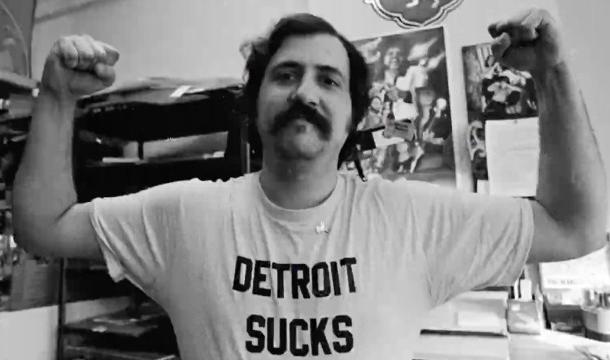
On April 30th, 1982, in New York City, friends of Lester Bangs discovered him unresponsive in his apartment at the age of 33. He had apparently accidentally overdosed with self-medicating drugs in an attempt to quash a bad bout of the flu. A record player in his apartment was still playing, Human League's album Dare, the record player needle repeatedly skipping at the end of the record. Later, receipts revealed that Bangs had just purchased the record earlier that day. Thus did this occasion tragically end the career of one of music's most noted rock 'n' roll critics.
I say "noted," but I don't necessarily say "beloved." Lester Bangs was certainly a man of passion with many brilliant observations about music, and beyond that, about why we listen to music and why artists make it. But he was never accused of sugar-coating; he openly revealed that his strategy for interviewing a musician was to "lead with the most insulting question [he] could think of."
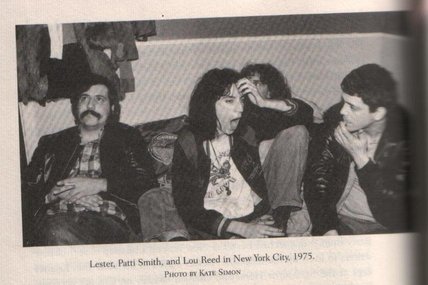
In a typical interview reprinted by The Guardian, Bangs interviews Velvet Underground legend Lou Reed and characterizes him as a washed-up, alcoholic sham. And Lester Bangs LOVED Lou Reed, practically worshiped him in fact! Lesser mortals received even less respect. However, this was famously one of the few times where Lou Reed gave an interviewer the time of day. The feisty and feral are always more appreciative of each others' company.
Lester's book: Psychotic Reactions and Carburetor Dung
Psychotic Reactions and Carburetor Dung was edited by Greil Marcus, and is a posthumous collection of Lester Bang's writing for Rolling Stone and Creem and other publications. I've read it, and never got around to blogging it. It is a challenging read altogether, because Bangs' writing style is a dense forest of page-length paragraphs and 3-line sentences, all while spouting constant jawbreakers from his considerable vocabulary and randomly referencing arcane details from his voracious knowledge field. That was quite a Bangs-ian sentence there, don't you think?
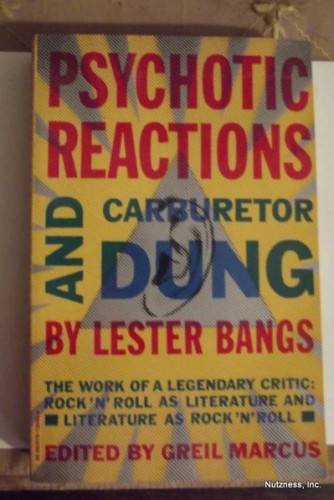
Nevertheless, Lester bangs was just that good at rock journalism. You didn't so much care which band he was writing about at any given moment, it was a joy merely to let his excited enthusiasm drag you through Tower Records like a kid in a candy store. There are a few other collections of Bangs' work, but generally - just as would a blogger of his time - he never really reached out to book publishing during his too-short career.
Rolling Stone still hosts an archive of Lester Bangs' work, albeit behind a paywall. Thus Bangs is immortalized forever as a rock star of gonzo journalism right beside Hunter S. Thompson and Tom Wolfe.
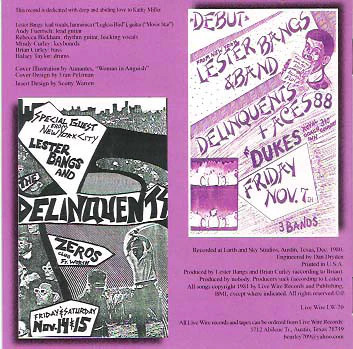
Lester Bangs Could Create As Well As He Critiqued…
While he never made a big deal about it, Bangs was a musician himself. Working with oddball collaborators and session musicians, he recorded covers of Velvet Underground songs and his own compositions produced by John Cale, also of VU fame. He also worked in collaborations with Ramones' associate Mickey Leigh to record "Birdland With Lester Bangs," playlist here, and again with the surf-rock group The Delinquents to produce an album Jook Savages on the Brazos, full album here.
Jook Savages on the Brazos is especially worth a listen, if you appreciate the intersection between raw garage rock energy and proto-punk.
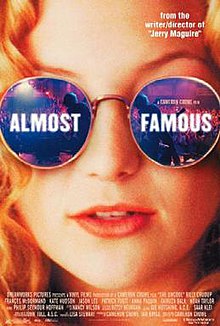
Lester Bangs' Influence Outreached His Journalism
R.E.M.'s song "It's the End of the World as We Know It" name-checks him.
Canadian indie rocker Scott B. Sympathy has a song "Lester Bangs Stereo Ghost" in tribute.
Most notably, the 2000 film Almost Famous has the character of Lester Bangs portrayed by none other than the late Philip Seymour Hoffman.
Most recently, there was the 2018 stage play How to Be a Rock Critic which is based on the life of Lester Bangs, with music composed by Steve Earle.
Finally, there is Jim DeRogatis, the biographer whom is the chief reason Lester Bangs' star did not fade into obscurity, with his work Let it Blurt: The Life and Times of Lester Bangs, America's Greatest Rock Critic. DeRogatis is himself a rock critic for the likes of Rolling Stone and the Chicago Sun-Times. Among his many crowning journalistic efforts, he was one of the first to break the story about R. Kelly's abuse and molestation scandals.
Of course, Lester Bangs' most enduring legacy is to be an inspiration to all the music critics, journalists, and bloggers (hey that's me!). Lester Bangs is our reminder to cut through the popular culture gibberish and talk about what really matters.
"The first mistake of art is to assume that it's serious." -- Lester Bangs

 Buy the Soundtrack, Skip the Movie: Brainscan (1994)
Buy the Soundtrack, Skip the Movie: Brainscan (1994)  Let’s Go to the Hop - Ignore That Door’s Four Bunnie...
Let’s Go to the Hop - Ignore That Door’s Four Bunnie...  Forgotten Weird Music Videos of the Ancient 80s | vol 3
Forgotten Weird Music Videos of the Ancient 80s | vol 3  Forgotten Weird Music Videos of the Ancient 80s | vol 2
Forgotten Weird Music Videos of the Ancient 80s | vol 2  Forgotten Weird Music Videos of the Ancient 80s | vol 1
Forgotten Weird Music Videos of the Ancient 80s | vol 1  Let’s Chase Taylor Swift Rumors
Let’s Chase Taylor Swift Rumors  When the Beatles Touched Off a Movie War
When the Beatles Touched Off a Movie War  When Mike Bloomfield Composed a Soundtrack For Andy ...
When Mike Bloomfield Composed a Soundtrack For Andy ...  Yet Another List of Bad Song Covers
Yet Another List of Bad Song Covers  Why Does Everybody Pick On Liberace?
Why Does Everybody Pick On Liberace?  Trainspotting Soundtrack Revisited : One of the Best...
Trainspotting Soundtrack Revisited : One of the Best...  Nicki Minaj and Megan Thee Stallion: Bringing Back t...
Nicki Minaj and Megan Thee Stallion: Bringing Back t...  Quirky Songs About Los Angeles
Quirky Songs About Los Angeles  Penguin Pete’s Obligatory Penguin Cafe Orchestra Post
Penguin Pete’s Obligatory Penguin Cafe Orchestra Post  Heart | How Bad Are Those Animals?
Heart | How Bad Are Those Animals?  That Time Ronnie James Dio Saved Black Sabbath’s Bacon
That Time Ronnie James Dio Saved Black Sabbath’s Bacon  What is a Left Hand Path? - Entombed and Swedish Dea...
What is a Left Hand Path? - Entombed and Swedish Dea...  Song Analysis Corner: Convoy (1975)
Song Analysis Corner: Convoy (1975)  What’s Up With Margaritaville?
What’s Up With Margaritaville?  This Album Links Duran Duran, Andy Warhol, and Kurt ...
This Album Links Duran Duran, Andy Warhol, and Kurt ...  Your Back-To-School Playlist
Your Back-To-School Playlist  Cucumber Castle | the other Bee Gees Movie
Cucumber Castle | the other Bee Gees Movie  Danny Elfman Scores New Film; Other Movie Weirdness!
Danny Elfman Scores New Film; Other Movie Weirdness!  Sparks Is Not Crying in Their Latte
Sparks Is Not Crying in Their Latte  Travis Scott : Rapper, Cannabis Entrepreneur, Filmmaker
Travis Scott : Rapper, Cannabis Entrepreneur, Filmmaker  Anders Runestad – Author and Music Blogger
Anders Runestad – Author and Music Blogger  What If They Really ARE Giants?
What If They Really ARE Giants?  Prince’s Underrated Under the Cherry Moon
Prince’s Underrated Under the Cherry Moon  Six Degrees of Blondie
Six Degrees of Blondie  Six Degrees of: Adam and the Ants
Six Degrees of: Adam and the Ants  Discovering Beat-Club | Vintage West German Music Show
Discovering Beat-Club | Vintage West German Music Show  Eurovision Contest Winners part 2
Eurovision Contest Winners part 2  Song Analysis Corner: Snoopy vs. the Red Baron | The...
Song Analysis Corner: Snoopy vs. the Red Baron | The...  Eurovision Contest Winners part 1
Eurovision Contest Winners part 1  KISS SUXX!
KISS SUXX!  You Haven’t Met Your Last Reefer Man
You Haven’t Met Your Last Reefer Man  Ruth Underwood and the “Zappa sound”
Ruth Underwood and the “Zappa sound”  Catchy Commercial Earworms | vol 2
Catchy Commercial Earworms | vol 2  Song Analysis Corner: “Trouble Every Day” | Frank Zappa
Song Analysis Corner: “Trouble Every Day” | Frank Zappa  Blues Music For Your Great Recession
Blues Music For Your Great Recession  We Can Fix America If We Just Bring Back Schoolhouse...
We Can Fix America If We Just Bring Back Schoolhouse...  Song Analysis Corner: Istanbul (Not Constantinople)
Song Analysis Corner: Istanbul (Not Constantinople)  Music To Shoot Down UFOs To
Music To Shoot Down UFOs To  Are You Ready For AI Music?
Are You Ready For AI Music?  How Dreary Was 1970s Adult Contemporary?
How Dreary Was 1970s Adult Contemporary?  I Just Called To Say Stevie Wonder's Song Deserved a...
I Just Called To Say Stevie Wonder's Song Deserved a...  "Knock On Wood" | The Real Song To Remember From Cas...
"Knock On Wood" | The Real Song To Remember From Cas...  Dr. Dre's Not Gonna Take This Anymore
Dr. Dre's Not Gonna Take This Anymore  Apache - The Shadows | A Surf-Rock Safari
Apache - The Shadows | A Surf-Rock Safari  New Year : New Music Artists You (Probably) Haven't ...
New Year : New Music Artists You (Probably) Haven't ...  Song Odyssey | I Put A Spell on You
Song Odyssey | I Put A Spell on You  KMart and S.S. Kresge | Music Mystery?
KMart and S.S. Kresge | Music Mystery?  Did I Ever Introduce You To Horrorpunk?
Did I Ever Introduce You To Horrorpunk?  Song Analysis Corner : The Coffee Song
Song Analysis Corner : The Coffee Song  Duran Duran Finally Got Inducted
Duran Duran Finally Got Inducted  That Time Taylor Swift Broke Ticketmaster
That Time Taylor Swift Broke Ticketmaster  Parody Songs and Lawsuits | Of Interest To Aspiring ...
Parody Songs and Lawsuits | Of Interest To Aspiring ...  Worst Band Spats
Worst Band Spats  Rock and Roll Bookshelf | Corey Taylor's Seven Deadl...
Rock and Roll Bookshelf | Corey Taylor's Seven Deadl...  Lizzo, the Flute, and Racist-Sexist Republican Fallout
Lizzo, the Flute, and Racist-Sexist Republican Fallout 